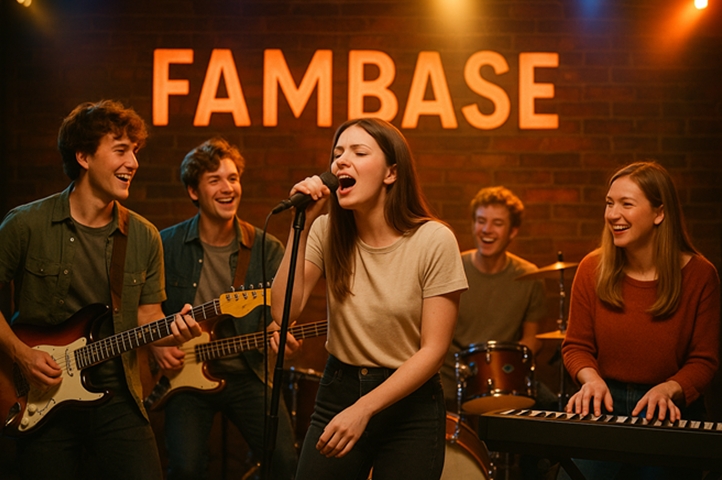
They are a five piece indie band. Evelyn writes the first drafts of melodies and lyrics. Noah shapes guitar textures and transitions. Ryan anchors the low end on bass. Ian holds tempo on drums. Stella builds harmonic depth on keys. In college, campus shows gave them a reliable cycle: rehearse, perform, adjust, repeat. The school provided venues, audiences, and a timetable that made momentum feel automatic. After graduation, that structure vanished, and staying in a band became an everyday logistics problem.
They did not break because of a lack of passion. What threatened them was the loss of continuity. When practice depended on ad hoc calls, rehearsal ended the moment the call ended. Notes, revisions, and unfinished ideas scattered across apps and private chats. Without a shared place to keep talking, reflecting, and building, chemistry slowed and progress stalled.
They tried common meeting and group video tools first. Calls connected easily, but the sound did not. These products are tuned for speech, so they compress resonance, harmonies, and the ends of accompaniment. When all five played at once, the blend flattened. Instead of locking into one pulse, they kept stopping to diagnose timing and then starting over. The tools were working as designed, just not for a band.
Public community platforms seemed like another option, but they brought new friction. Setting up servers, permissions, and channels took time they did not have. More importantly, unfinished songs felt too exposed in open spaces. Early drafts need room to be rough. They wanted feedback, not a public verdict before a chorus had even found its shape.
What they needed was simple but specific: one place that could hold rehearsal, review, everyday closeness, and the support that helps a young band survive. They found that place in Fambase.
Bringing Rehearsal Into One Group Reconnected Both Their Bond and Their Progress
After moving in, they created a band group on fambase. It became the single entry point for their week. Before practice, they dropped in whatever needed to be tried next. A new chorus line, a transition idea, a small change in groove. After practice, they stayed in the same thread to note what still felt off and what to push next time. Because everything lived in one group, the band did not lose the trail of its own progress.
Outside rehearsal, the fambase group also carried everyday conversation. They talked about work, a show someone watched, or a song that sparked a thought. The point was not casual chatter. It kept their relationship current, and that mattered in practice. Knowing each other’s mood and rhythm made it easier to align quickly, and disagreements about feel or tempo resolved faster because the bond was not only rebuilt once a week.
A practice or two later, they noticed live was built into the group. They stopped jumping to another app and started rehearsing by opening a multi person live session inside the same space. The session felt closer to a real room. Everyone’s camera was equal, so no one was treated as a host and no one as background. They entered together, listened together, and corrected together. Full layers stayed audible, which meant they could solve problems by playing through a section again instead of explaining what went wrong.
Because the group belonged to them, early drafts stayed inside their boundary. They could try a rough bridge or an unsteady chorus without worrying about strangers entering or half finished work drifting outward. That safety lets them experiment more freely and move faster.
As rehearsals stabilized, a small circle of early supporters began showing up consistently. They later opened a companion group for these listeners on the same platform. Once a month they shared a small live set there, letting this circle hear new songs first. Feedback stayed specific and steady because it came from the same people over time. Some knew arranging or vocals and offered practical notes. Others gave simple emotional reads that helped the band sense what was landing. Over time this became a lightweight external production brain that helped them improve each track.
That group also supported the band’s survival in practical ways. The band was not making real money yet. Scattered gigs could not cover instruments or demo costs. Support inside Fambase went directly toward the next concrete step: a more reliable guitar, studio time, another demo. This was not about profit. It was about keeping the project running. Supporters could see the process, hear revisions, and stay close to the band’s growth without leaving the space.
When Companionship and Support Continue in One Place, the Band Can Keep Moving Forward
After some time, their feelings were simple. They used to loop through “schedule rehearsal, open a call, finish and disperse, then return to separate routines.” Now, things flowed. Rehearsal started and ended in the same group, reviews and revisions stayed connected, and day-to-day contact made coordination more natural. The multi-person rehearsal experience also felt like a real ensemble playing again, with full layers and on-the-spot alignment. Gradually, songs came faster and chemistry steadied.
For anyone leading an early-stage band, or hoping to place rehearsal, creation, and supporters in one continuous home rather than across scattered tools, Fambase offers a practical start. Create a band group, open a multi-person live rehearsal next time, and see whether the rhythm of working together becomes instantly more coherent.
Media Contact
Company Name: Fambase
Contact Person: Evelyn Skye Valentine
Email:Send Email
City: Los Angeles
State: California
Country: United States
Website: https://joinfambase.com/?s=95
